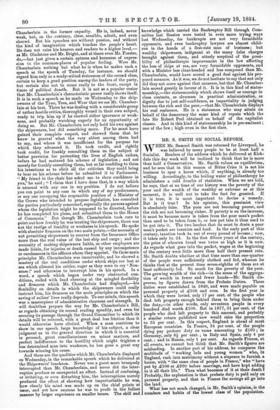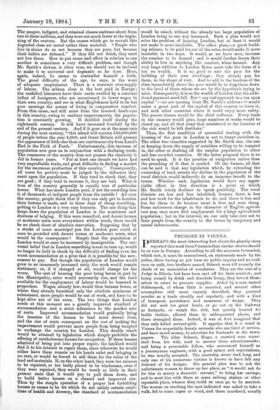MR. S. SMITH ON SOCIAL REFORM.
WHEN Mr. Samuel Smith was returned for Liverpool, he was believed by many people to be at least half a Socialist. Readers of the address which he delivered at Kirk-
dale this day week will be inclined to think that he is more than half a Conservative. Mr. Smith values an equilibrium, and he sees that in this season of Bitter Cries it is not his business to spur a horse which, if anything, is already too willing. Accordingly, to the boiling water of philanthropy he administers a cold douche of statistics. When we are told, he says, that at no time of our history was the poverty of the poor and the wealth of the wealthy so extreme as at this moment, it is well not to take the fact for granted. If it is true, it is most important to devise a remedy. But is it true ? In his opinion, this pessimist view is absolutely false. The poor are not becoming poorer, and the rich are not becoming richer. If poverty is on the increase, it must be because more is taken from the poor man's pocket than used to be taken from it, or less put into it than used to be put into it. The two leeches that do most to drain a poor man's pocket are taxation and food. In the early part of this century, taxation took 4s. out of every pound of income ; now, it takes only Is. 2d. In the first fifteen years of the century, the price of wheaten bread was twice as high as it is now. As regards what goes into the pocket, wages at the beginning of the century were little more than half their present rate. Mr. Smith doubts whether at that time more than one-quarter of the people were sufficiently clothed and fed, whereas he thinks that at the present time seven-eighths of them are at least sufficiently fed. So much for the poverty of the poor. The growing wealth of the rich—in the sense of the aggrega- tion of wealth in fewer and fewer hands—Mr. Smith dis- proves, by figures drawn from the Probate Duties. These duties were established in 1840, and were made payable on personal property of ..t100 and over. In the first year in which they were levied, only 17 per cent. of the people who died left property enough behind them to bring them under the duty,—in other words, only seventeen people in every hundred died worth £100. But in 1877, 31 per cent, of the people who died left property to this amount, and probably a similar return published now would raise the proportion to 35 per cent. In this respect, England is ahead of most European countries. In France, 24 per cent. of the people
dying pay probate duty on -sums amounting to £100; in
Germany, only per cent. ; in Italy and Spain, only 4 per cent. ; and in Russia, only 1 per cent. As regards France, at all events, we cannot but think that Mr. Smith's figures are misleading. In another part of his address, he compares the multitude of "working lads and young women" who, in England, rush into matrimony without a sixpence to furnish a house, with "the same class of people in France," who "have put by £100 or £200 before marriage, and have kept adding to it all their life." Then what becomes of it at their death Probably, the explanation is that probate duty is paid only on personal property, and that in France the savings all go into the land.
What has not much changed, in Mr. Smith's opinion, is the numbers and habits of the lowest class of the population.
The pauper, indigent, and criminal classes embrace about from two to three millions, and they were not much fewer at the begin- ning of the century. But the causes which go to recruit this degraded class are moral rather than material. "People who live in slums do so not because they are poor, but because their habits are debased." If they did not drink, they need not live there. How to put cause and effect in relation to one another is sometimes a very difficult problem, and though Mr. Smith's dictum is often true, we should not be inclined to make it so universal and dogmatic as he does. Here, again, indeed, he seems to contradict himself a little. The great difficulty of the age, he says, is the want of adequate employment. There is a constant over-supply of labour. The artisan class is the best paid in Europe ; the unskilled labourers have their ranks swelled by a constant influx of foreigners, who are accustomed to lower wages in their own country, and see in what Englishmen hold to be but poor earnings the means of living in comparative comfort. From this cause, and still more from the lowered death-rate in this country, owing to sanitary improvements, the popula- tion is constantly growing. It doubled itself during the eighteenth century. It will have increased fourfold by the end of the present century. And if it goes on at the same rate during the next century, "this island will contain 150,000,000 of people before the year 2,000, and Great Britain will present the appearance of little else than one continuous city from Land's End to the Firth of Forth." Unfortunately, this increase of population now goes on in conjunction with a declining trade. The commerce of the country does not possess the elasticity it did in former years. "For at least one decade we have had very unprofitable trade, and great difficulty in finding a market for the enormous production of this country." Consequently, all cures for poverty must be judged by the influence they exert upon the population. If they tencl.to check that, they are good ; if they tend to increase it, they are bad. What is trim of the country generally is equally true of particular towns. What has made London poor, if not the crowding into it of thousands of indigent people from the outside ? All over the country, people think that if they can only get to London their fortune is made, and in these days of cheap travelling, getting to London is a very easy business. The one thing that keeps down the population of London is the scantiness and dearness of lodging. If this were remedied, and decent houses at moderate rents were everywhere within reach, there would be no check short of absolute starvation. Supposing that by a stroke of some municipal pen the London poor could at once be provided with decent rooms at moderate rents, what would be the consequence ? Simply that the population of London would at once be increased by immigration. The uni- versal belief that in London something is sure to turn up, would no longer be held in check by the difficulty of finding even the worst accommodation at a price that it is possible for the new- comers to pay. But though the population of London would grow in an immensely increased ratio, the work would remain stationary, or, if it changed at all, would change for the worse. The cost of housing the poor being borne in part by the Municipality, rates would necessarily rise, and the fund available for the employment of labour would be lessened in proportion. Wages, already low, would then become lower, or where they already furnished only the absolute minimum of subsistence, more people would be out of work, and have to be kept alive out of the rates. The two things that London needs at this moment are a greatly improved standard of accommodation and a strict adherence to the market rate of rents. Improved accommodation would gradually bring the inmates of the houses to lead more decent lives, and the rise of rents consequent on the cost of making the improvement would prevent more people from being tempted to exchange the country for London. This double result would be attained by legislation which simply prohibits the offering of unwholesome houses for occupation. If these houses admitted of being put into proper repair, the landlord would find it to his interest to repair them, since otherwise he would either have them remain on his hands unlet and bringing in no rent, or would be forced to sell them for the value of the land and materials. If, on the other hand, they were too ruinous to be repaired, or too badly placed to be wholesome, even if they were repaired, they would be worth so little in their present state that it would pay to pull them down, and to build better houses on a cleared and improved site. Thus by the simple operation of a proper law forbidding houses or rooms to be let which do not satisfy certain condi- tions of health and decency, the standard of accommodation would be raised, without the already too large population of London being in any way increased. Such a plan would not solve the problem of housing London, but at least it would not make it more insoluble. The other plan,—a great build- ing scheme, to be paid for out of the rates, would make it more insoluble in two ways. It would, as we have seen, increase the number to be housed ; and it would farther lessen their ability to live in anything like comfort, when housed. Any very large addition to London Rates must take the form of a tax on wealth. It is no good to rate the poor for the building of their own dwellings ; they already pay for them, in the shape of rent. And to add to the burdens of the class immediately above the poor would be to drag them down to the level of those whom we are by the hypothesis trying to raise. Consequently, it is on the wealth of London that the addi- tional payment must fall. But" any real approach to a tax upon capital "—we are quoting from Mr. Smith's address—" would cause a great part of the capital of this country to leave it, and seek other countries where it could enjoy more safety. The poorer classes would be the chief sufferers. Every trade in the country would pine, large numbers of works would be closed up, and all that army that ministered to the luxuries of the rich would be left destitute."
Thus, the first condition of successful dealing with the housing of the poor in London is not to tempt outsiders in. The other two remedies suggested by Mr. Smith aim, the one at keeping down the supply of outsiders willing to be tempted in the other at drafting off the surplus population to other and less crowded countries. Of the latter proposal there is no need to speak. It is the practice of emigration rather than the preaching of it that is needed. Of the former, all that can be said is that any legislation which, by extending the ownership of land, arrests the decline in the population of the rural districts would indirectly do an immense benefit to the towns. Whether such legislation would have any appre- ciable effect in this direction is a point on which Mr. Smith wisely declines to speak positively. The rural districts are less and less inhabited, because there is less and less work for the inhabitants to do, and there is less and less for them to do because meat is dear and corn cheap. Some unforeseen change in the character of English agricul- ture may once more find employment for a large agricultural population ; but in the interval, we can only take care not to draw people from the country to the towns by temporary and unreal inducements.



































 Previous page
Previous page